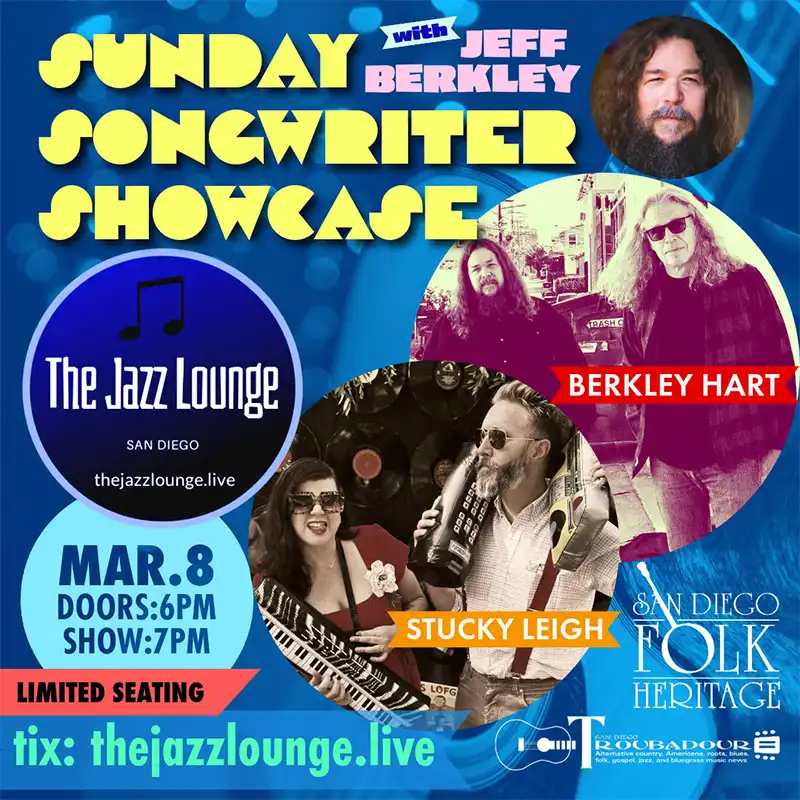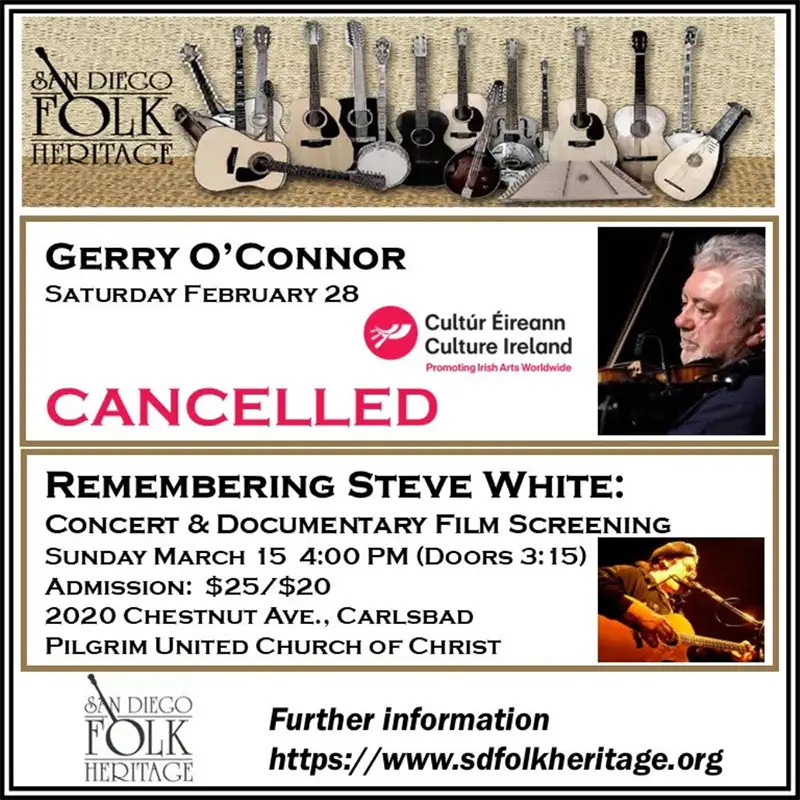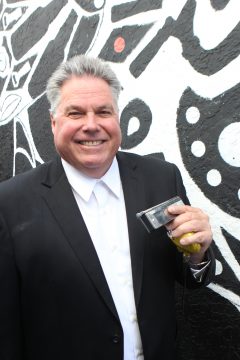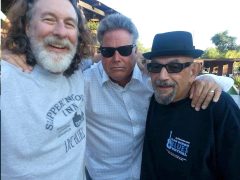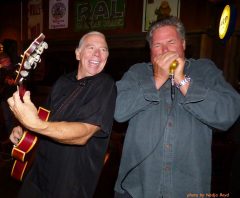Cover Story
The Here and Now: Smokin’ Blues from CHRIS FAST!
I’ve known Chris Fast for too many years to remember and he’s always been funny. You know that dry funny? A gift he shares with surgical precision in every blues bar, club venue, house party, and festival stage across Southern California. On this night, with a full bar and a rowdy crowd, Chris fills between songs with his charm and wisdom. “On my way over to the club tonight, I got a call from the record company and they told me, ‘Chris, your new album, Moz Live, has just gone… plywood!’ He pauses to let that sink in, then adds. “I guess that’s up from drywall! I just know it’s not platinum yet! [laughing]
Laughter and blues are not words usually associated with each other, but that’s not the case with Chris Fast. So I had to ask, were you the classroom entertainment in school? “Well, I was suspended many times!” [laughing] “I am not funny!” Fast insists [laughing], “I gotta do something because those guys [the band] have to catch their breath, they’re tired, they’re getting old!”
Let’s come back to the “old guys” later. But since you brought it up, let’s start with the last album, Moz Live (reviewed in this issue). It’s been out for awhile and you’ve picked up broadcast and internet radio play in America and Europe. “Germany, England, Poland, the Netherlands,” Chris says. “It’s blowing up in Paris!” That’s impressive! “Perris… California.” [laughing] He shakes his head. “Surprisingly, due to social media, I’ve connected to all these harmonica players around the world. And they’re actually playing Moz Live on blues internet shows. Go figure.”
You think going viral may lead to tours? “Well, I’ve been talking to some guys in the Netherlands about that.” Chris says. “Possibly in the spring. It may happen. But you know, I’m just happy with what I do—being able to play, and to play what I want to play. And I have a great group of guys that are with me: Al Schneider, Don Skelton, Steve Wilcox, and Dana Duplan as the core group. They’re great guys and great musicians… I have nothing to complain about.”
The Chris Fast Band is known for their live shows. Were there any reservations when you decided to release a live recording? “What was especially nice,” Chris says, “was that we paid no attention to the fact that we were recording. We played with our total focus on the performances and connecting with the audience. In that way, the songs on Moz Live are a completely honest representation of, and a clear snapshot of what the Chris Fast Band was doing at this particular point in time… complete with the mistakes and audience chatter that you hear at a gig. The music is allowed to breathe, and I find it refreshing! You don’t get that when you do a studio album.”
Now let’s talk a little about the rhythm section for the Chris Fast Band. “We’ve been together a few years now,” Chris says. “Al Schneider is playing drums. Of course, he played with the Everly Brothers. He toured a long time with them. He’s been at it for quite awhile. In fact, he told me the drum kit he’s playing now, he bought in ’58. So, I don’t know what that means… he’s not a youngster. But, man the guy can play, he’s great. He’s on it… powerful. He’s a good connection for the San Diego area, he knows everybody. He’s always out there.”
You have a pair of guitarists. “Steve [Wilcox] probably plays 90 percent of the gigs. And Dana [Duplan] is playing more…and they both bring different things to the band. And then Don Skelton plays upright bass. He’s kind of a jazzer and he really knows what he’s doing. He’s really proficient. He knows his way around a bass and can read… and he’s a really good guy. So everybody gets along really well.”
*************
When asked, the band was only too willing to participate in this article. And to no one’s surprise, they’re all comedians. Here are just a few stray shots from the guys. “Chris is a working man’s musician, but he’s retired now!” Another… “What can you say about Chris Fast that hasn’t already been written on the bathroom wall?” And my favorite. “He’s a snappy dresser.” Funny guys who just happen to share a love for the amplified blues that shook Chicago clubs and dive bars during the ’50s and ’60s… and that they take very seriously.
So, kidding aside, I asked the band members what they like about playing in the Chris Fast band? “I have a blast when I play with Chris and the band,” says bassist Don Skelton. “I would say we are friends first and musicians second. We laugh a lot and really don’t take ourselves too seriously. He runs his band pretty loosely during performance, which gives us all an opportunity for musical expression and to really stretch out on stage. Finally, Chris will listen to input from his bandmates and consider your ideas. That’s important to me.”
Drummer Al Schneider commented on his band leader. “During my 60-year career playing music, Chris is, with the possible exception of Rock ‘n’ Roll Hall of Famer Don Everly, the best front man I’ve ever played behind… but don’t tell him that!”
Guitarist Dana Duplan adds, “Everyone knows what a great singer and harmonica player Chris is. At one of our gigs Chris invited a guest up to sit in on harp. I knew Chris played guitar, but I’d never really heard him. So, I handed him my guitar and said, ‘Why don’t you back the guest.’ He proceeds to blow me away!! Then, later, I found out he’s also a sax player!! Not fair!!”
Guitarist Steve Wilcox says, “What can I say about Chris Fast? Chris is a consummate harp player. He has spent years perfecting his craft in terms of tone and technique, and it shows!! Like many of us he’s loved the blues his whole life and been part of the So Cal Blues scene for more than 40 years. I love working with Chris, his sense of humor, musicality, and the CF Band all working together makes me a better player. We have a blast!”
The band is still pretty focused on straight-up Chicago-style blues? “Nothing changes on my end.” Chris says. “I’m playing real Chicago blues, that’s what I’m doing now. Previously with Little Chris and the Night Crawlers band we were kind of a hybrid; we played a lot of blues but we had the R&B influence with the horns and a lot of good arrangements, so it was a different kind of thing than the four-piece Chicago sound I’m currently involved in.”
Why the change? “I used to play in a band with Bob Newham and Willie Brinlee and the guys that went on to back Bill Clark, and growing up in Riverside with Rod [Piazza] we were always playing Chicago blues. I played in his [Piazza’s] band for a short period of time, playing guitar and saxophone with Richard Innes, Jerry Smith, and Rod, and Glenn Ross Campbell was playing the slide guitar. Chicago blues has always been a love of mine, but it just so happened the personnel I got with [the Nightcrawlers] were Fred Rivera and Henry Barrio, Dennis Kenmore, Alfredo Ballesteros, Tommy Bray, and Bud Dehl. We had horns and a pretty big sound. It was kind of eclectic, I would say. It was a fun band to play with.”
You recorded a CD called Funky Highway. “Well, Henry Barrio was with the Nightcrawlers and before that he played with Hoyt Axton for years. He’s a great guitar player and a really good arranger with really good musical sense. Alfredo Ballesteros, a tenor player, was with the Boxing Ghandi’s on Atlantic Records, he’s a great jazz/rock tenor player. And we were with the Nightcrawlers for all those years, so Henry and I were just looking for something to do. Henry would come over and record at my house. I had a little setup and I would write a song and he and I would arrange it and put our basic tracks on it. Henry can play all these different styles. Then Alfredo would come over and put a horn part on it or we would get Tommy Bray, a trumpet player, to come over and do something and over time we put together a few songs.”
It’s been well over 20 years since I first saw you playing with Little Chris and the Nightcrawlers. You were playing out in the vineyards around Temecula. “In those days,” Chris grins, “we had the Temecula area to ourselves. We played everywhere we wanted… we were playing at Pechanga all the time. We opened shows for B.B. King and the big blues shows they had out there.”
Let’s talk about your style of blues and the music you play. “Right now, we’re playing a lot of Little Walter material just because it’s challenging. And, today, nobody around the San Diego area seems to be playing it. When I was younger, everybody was playing Little Walter stuff and now it doesn’t seem to be that way. People my age started playing music in the ’60s when the blues invasion rolled through. When I was in high school we heard, I guess it was the Stones playing some blues and then we started investigating and found out about the guys that originated the music. There was a huge wave of people who were
blues enthusiasts at that time. Right now that wave is a little bitty ripple and everybody’s getting older; we’re all getting older, it’s not a super popular thing, but I’m going to keep doing it as long as
I can.”
Social media has changed some of that. “It’s all over YouTube.” Chris agrees. “Back in the day when I was starting, I had to borrow records. Rod [Piazza] gave me my first Little Walter record and said, ‘Hey, Listen to this!’ And I listened to it and it was weird to me, because it was a whole different style of playing. Of course, Rod was totally off into it and then I started learning it.”
You’ve been an educator and your road has taken multiple twists and turns. Did your family encourage or influence your direction? “Yeah, I taught school, but my father gave me a harmonica when I was a young boy. I was a little kid and I’d walk around playing this silly harmonica, so I was always oriented toward the harmonica. In Junior High School I think the folk music thing was going pretty good and some of my friends decided to put together a little band and I was going to play the harmonica. We had a couple of folk guitars and we played at a talent assembly and that’s where it kind of started. I got into some rock bands early on, but we’d play some blues tunes as well and it just sort of evolved from there. Somewhere early on, I remember we had some jam sessions in the summertime and Rod Piazza was involved in those. There was a core group of musicians that would meet every week and I would go down there and play. I started hearing what he was doing and we developed a friendship. As I got older I was playing in blues bands around town. He would pick me up at my house and take me into L.A. where he was playing and all these other guys were playing in these black clubs. I would go with him and he would have his pizza under the front seat for his meal, saving money!” [laughing] “But it was a great education for me.
“Later on because I knew all the harmonica songs, he needed a guitar player and I could play some guitar. I never considered myself a very good guitar player and I proved it every night. I could play okay, just enough to back him. The real soloist was Glenn Ross Campbell who played slide. He was in the Misunderstood and other bands and he was a virtuoso kind of player. Richard Innes played drums and Jerry Smith played bass and Rod was blowin’ harp. So I learned a lot, night after night sitting there behind Rod.”
Who were some of the people you saw and played with in those early days? “We backed up Big Joe Turner and Pee Wee Crayton was playing with us at one time. We opened shows for John Lee Hooker and later on I was able to work with Percy Mayfield and Big Mama Thornton.”
Can you talk a little about Percy Mayfield? “He was just a real sweet guy. Talk about a songwriter, he was the best. Nobody wrote a song like Percy Mayfield. I don’t think anybody was better. Nobody! We were on stage one time and the lights went off and Percy said to me, ‘Do they want me off?’ Because he was kind of insecure, like a lot of musicians are, and of course he had had that accident and stuff. I said, ‘Don’t worry about it, man. You are good!’” [laughing]
You cover Percy’s “You Lied to Me.” “I was listening to my iPod and that one came up. I thought, ‘Oh, man that’s a good one.’ So, I recorded it. In fact, I played guitar on that particular song, for what it’s worth. You can’t miss with a Percy Mayfield song. He just had a way of writing; his tunes are special.”
How long did you get to work with Percy? “I played a few gigs with him in San Bernardino at a place called the Kola Shanah. I wasn’t like great buddies with him or anything. You know all those guys were out in L.A. at the time, Joe Turner and everybody.”
Growing up near and getting to know Rod Piazza was a fortunate happenstance in your musical direction, was it not? “Yeah, I was lucky he lived in town. Talk about a great role model to have—you know, as an aspiring harmonica player. Rod has always welcomed guest players; if he thinks you’re halfway decent he doesn’t have a problem getting you up there. In fact, he welcomes it because, for one thing, he can take a break. And then when you’re done he can say, ‘Okay, I’ll show you how it’s really done.’” [laughing] “It’s a good little foil for him. Rod, of course, has played with everybody. He played with the real guys. We’re just trying to get a good sound and all that stuff, but he was really there with all the guys that were out in L.A.”
And you are kind of an anomaly actually being from California… “Born in Riverside,” Chris nods. “I knew Rod for a long time; we would go fishing and his dad would put together the cheese garlic bait for us. It was a neighborhood thing. It was perfect. If I’m any good at all, it’s because of being around Rod and good harmonica players.
I’m not trying to imitate Rod, but I think we are both admirers of Little Walter. If you’re a harmonica player, who are you gonna’ want to listen to? Big Walter, George Smith, and all those guys are the tip of the top. Then there’s Jimmy Reed and all those greats, like Muddy. I love all that!”
What is it about harp players? Not to frighten you, but most seem to have a very short life span? [laughing] “Little Walter was crazy,” Chris laughs. “Rod told me Walter would seek out the worst people he could find, and that’s who he would hang with. You’ve probably known people like that. They just can’t resist and that’s the people they seek, the lowest common denominator and that’s what they enjoy. I don’t know, there’s a physical quality to the playing, it takes strength to play the harp, it takes a little energy, I think.”
Outside of the Chicago sound—or blues in general—what other music appeals to you? “I listen to a lot of jazz. If I’m listening to music, I’ll be listening to jazz. I appreciate that, and I imagine if I was a better musician or more educated in music, maybe I would be a jazz musician perhaps, I don’t know. I love Wes Montgomery and I like the sax players like Coltrane and all those guys.”
It’s often said and comparisons have been made with Little Walter’s amplified harp sound being very similar to saxophone lines. “Right, to get the instrument to sound bigger, to sound like a saxophone, Walter was playing, of course, swing music was big at that time in the early ’50s, and Louis Jordan was having a lot of hits as an alto player and people would learn his lines and play it in their music. It really had more of a swing to it.”
Swing music seems to be trending again. “There are venues that want swing dancing,” He smiles. “So this may be a good opportunity. We’ve been so fortunate; we’ve been invited to a number of festivals. We got to play up in Riverside at the West Coast Blues Festival. We played Gator by the Bay and the Adams Avenue Street Fair. We’ve done pretty well; we’ve gotten around, even a festival in Yuma.”
Can you talk a little about your writing style? “I would say that I don’t have a style.” [laughing] “I wish I was better at it. But I do enjoy coming up with something original. I strive to write a song that in some way isn’t full of clichés… I’m not trying to be different, but I’ve noticed some people have a tendency to grab a line from one song and a line from another song and you put it together and you’ve got something brand new. And maybe you do, because that’s what we all do anyway. We steal and borrow everything that we do, whether it’s the notes we play, how we play them, or the lines we put in our songs… but I enjoy writing.”
Is original music always a pursuit for you? “Yeah, I’ve written a bunch of stuff, and we’ll record at the house.” Does your studio have a name? “Aguacate Studios.” Chris laughs. “I remember that Delaney Bramlett at the Rock ‘n’ Roll Ranch had a studio and they called it ’Carnegie Hell!’” [laughing]
So you’re planning a new project of all originals? “That’s really the way to go. When I recorded Moz Live, I think everything on there is a cover, except one. On this next one I think they’ll be mostly originals. I think I have some good tunes. I mean, I think they’re okay.” Nice way to start the new decade, something fresh out of the Aguacate Studios from the Chris Fast Band.
Do you feel that your harmonica style has changed over the years? “I find that in my playing, I’m playing less. I don’t go off on super extended solos; I try to make the notes count, I don’t play a lot of extra stuff.”
What drives you as a musician? “It’s just fun! To me, playing is fun. That’s what it’s all about. Honestly, Tim, I feel like a teenager now… well, I have the maturity level of an eighth grader. At this point in my life I don’t have any responsibilities and I don’t work at a regular job. I’m just real fortunate to be playing music. It’s just a blast, and I really love all the gigs that I play. I feel that I don’t deserve more than what I’ve got. You know what I’m saying? I’m content where I am and we’re received well wherever we play. How do you ask for anything more? I’m playing exactly what I want to play, and I’m not compromising that in any way.”
So, 2020 is here, what’s next for Chris Fast? “I don’t have a plan. I’m taking it one week at a time. If you have a plan, that means you have a goal… and my goal is to be out playing—that’s really my goal. That’s all I want, I just want to be out playing and to establish myself as a harp player in the San Diego area. I think I’m doing okay at it, I’m having fun anyway.” As all good bandleaders do, Chris gives credit to those around him. “And I’d be nothing without the musicians I perform with: Al, Don, Steve, and Dana. I’m a lucky guy and fortunate to have them with me… they provide constancy in the band’s sound.” Chris flashes a big grin. “I guess I do have a goal—I’m just going to play on out. I’m just going to keep playing until I can’t play anymore. That’s what I’m gonna do.”
Sounds like a great plan to me.
The Chris Fast Band will be playing at Humphrey’s Backstage Live on Monday, January 27, 7pm, 2241 Shelter Island Dr.




